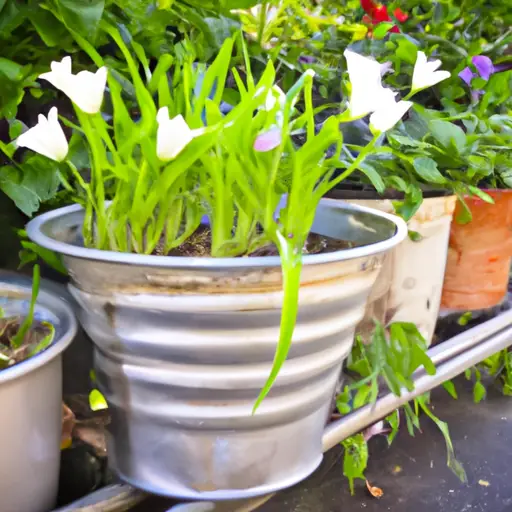Green Living Made Easy: Cultivating an Eco-Friendly Container Garden
In today’s world, where sustainable living and natural resources conservation are of utmost importance, incorporating eco-friendly practices into our daily lives is crucial. One way to achieve this is by cultivating an eco-friendly container garden. This article will guide you through the process of setting up and maintaining a container garden that not only enhances your living space but also contributes to a greener planet.
1. Choosing the Right Containers
The first step in creating an eco-friendly container garden is selecting suitable containers. Opt for containers made from recycled materials such as reclaimed wood, metal, or plastic, as these materials have a lower environmental impact compared to new ones. Additionally, consider reusing items like old buckets, tires, or teapots as unique and creative planters.
2. Selecting Sustainable Soil
To cultivate a healthy container garden, it’s vital to choose the right soil. Avoid synthetic fertilizers and opt for organic alternatives such as compost or worm castings. These natural sources provide essential nutrients to your plants while enriching the soil in an environmentally friendly way.
3. Growing Organic Seeds and Plants
When starting your container garden from scratch, choose organic seeds or seedlings to avoid introducing harmful chemicals into your gardening space. Look for local nurseries that specialize in organic plants or explore online platforms dedicated to organic gardening.
4. Water Conservation Techniques
Water scarcity is a global issue that we should tackle at every opportunity we get. Implement water conservation techniques, such as investing in self-watering containers or using drip irrigation systems that efficiently provide water directly at the roots of your plants while reducing water waste through evaporation.
5. Composting Kitchen Waste
Implementing composting practices within your container garden not only reduces waste but also provides nutrient-rich soil amendments for your plants. Collect kitchen scraps like fruit peels, coffee grounds, and vegetable cuttings in a compost bin or vermicomposting system. Once broken down, this organic matter can be added to your container garden as a natural fertilizer.
6. Natural Pest Control
Keeping harmful pests at bay without resorting to chemical-laden pesticides is an essential aspect of eco-friendly gardening. Encourage beneficial insects like ladybugs and lacewings that prey on pests, or use natural pest repellents such as neem oil, garlic spray, or homemade insecticidal soap to maintain a healthy balance within your garden.
7. Attracting Pollinators
Creating a habitat where pollinators can thrive is not only environmentally friendly but also necessary for the success of your container garden. Plant flowers like lavender, marigolds, and sunflowers to attract bees, butterflies, and other pollinators that aid in the fertilization process.
8. Sustainable Harvesting and Seed Saving
When harvesting crops from your container garden, practice sustainable harvesting techniques by only taking what you need. This ensures that plants can continue to grow and produce more food. Additionally, consider saving seeds from open-pollinated plants to create a self-sustaining cycle in future plantings.
9. Reusing Resources
Embrace the concept of reusability within your container garden by finding creative ways to repurpose materials. For instance, use old pantyhose or tights as plant ties instead of plastic twine or repurpose glass jars as terrariums or miniature greenhouses.
10. Sharing the Green Living Experience
One of the most rewarding aspects of cultivating an eco-friendly container garden is sharing the experience with others. Engage your friends, family, and community members by organizing workshops or hosting swap events where participants can exchange excess produce or seedlings from their gardens.
In conclusion, cultivating an eco-friendly container garden is an easy and rewarding way to contribute to a greener planet while enhancing your living space’s visual appeal. By selecting sustainable containers, using organic soil and seeds, conserving water, composting, employing natural pest control methods, attracting pollinators, practicing sustainable harvesting and seed saving, reusing resources, and sharing the experience with others, you can create an environmentally friendly oasis that promotes green living. Remember that small actions can make a big difference when it comes to living in harmony with nature.













